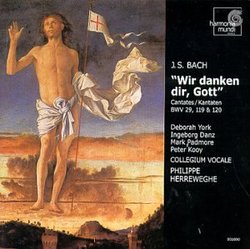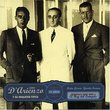| All Artists: Johann Sebastian Bach, Philippe Herreweghe, Deborah York, Mark Padmore Title: Bach: Wir Danken Dir, Gott Members Wishing: 0 Total Copies: 0 Label: Harmonia Mundi Fr. Release Date: 5/9/2000 Album Type: Import Genre: Classical Styles: Opera & Classical Vocal, Historical Periods, Baroque (c.1600-1750) Number of Discs: 1 SwapaCD Credits: 1 UPC: 794881498222 |
Search - Johann Sebastian Bach, Philippe Herreweghe, Deborah York :: Bach: Wir Danken Dir, Gott
 | Johann Sebastian Bach, Philippe Herreweghe, Deborah York Bach: Wir Danken Dir, Gott Genre: Classical
Bach's composer-in-residence status made him responsible for writing music for municipal affairs, a duty that entailed serving both practical and spiritual purposes. The three cantatas collected here were written in Leipzi... more » |
Larger Image |
CD DetailsSynopsis
Amazon.com Bach's composer-in-residence status made him responsible for writing music for municipal affairs, a duty that entailed serving both practical and spiritual purposes. The three cantatas collected here were written in Leipzig to mark the renewal of civic courts. The lyrics make metaphoric references to the city; much of the text is drawn from Psalms. Fitting the cantatas' public nature, Philippe Herreweghe has treated them as celebratory, colorful, and often sprightly, certainly less somber and morally complex than, say, Joshua Rifkin's recordings of Bach cantatas. Recitative moments often attend a meditative pace, and though there are spoken moments here, they are brief, just parts of a larger mosaic that ranges from soprano with violin accompaniment to full orchestra. These are joyous expressions of God's blessing, and the performances do them justice. The depth of the recorded choruses, in particular, is remarkable--the manner in which the distinct timbre of various vocal parts is maintained even as nearly 20 voices work together. The effort of individual performers is also paramount, notably the extended organ introduction to No. 29 (among the set's many resplendent flourishes), a number of chamber settings for violin, and star turns by soprano Deborah York and bass Peter Kooy. --Marc Weidenbaum Similar CDs
|
CD ReviewsGlorification of God and municipal pride 06/17/2000 (5 out of 5 stars) "I think, Herreweghe is getting better each time as regards his Bach-recordings. Those who had the impression that his recordings are a little pale, as I did, I would say that is true as for some of his older discs. In his more recent ones, he proves the contrary. The choir sounds fresh and aggressive, but at the same time very organic and smooth. The orchestra is splendid, especially this holds for the four trumpets which fulfil an important role in the glorification-style choirs. The Soloists are excellent, I would say some of the best you may find at the moment in the field of Bach-interpretation. Hopefully, Herreweghe, his ensemble and technical engineers keep going on like this." Highly effective hcf | 08/27/2000 (5 out of 5 stars) "I have all of Herreweghe's recordings of Bach. I am a fan of the balmy precision and spotless polish of Herreweghe's approach, but if you're looking for edgier performances you may want to look elsewhere. Herreweghe's recordings of Bach are organized thematically. This CD, featuring cantatas Bach wrote for the annual inauguration of the Leipzig town council, is perhaps less momentous than Herreweghe's previous CD exploring the Lutheran perspective on death ("Mit Fried und Freud"), but it is delightful nevertheless. The narrow municipal purpose of these cantatas is transcended by the rich scoring of the instrumental parts and the subtlety of the arias. Other than Ingeborg Danz (whom I don't consider to be the most appropriate Bach alto), the soloists here would be my top choice for any Bach recording. The marvelous Peter Kooy doesn't get a lot to sing, but the few lines he does sing practically steal the show. Mark Padmore is nearly perfect in "Wohl dir, du Volk der Linden" (although a bit less so in "Halleluja, Stärk und Macht"). Deborah York dazzles with "Gedenk an uns mit deiner Liebe" - possibly the highest point of the entire Herreweghe Bach series. I'm looking forward to future Herreweghe Bach releases. -- gggimpy@yahoo.com"
|

 Track Listings (23) - Disc #1
Track Listings (23) - Disc #1
